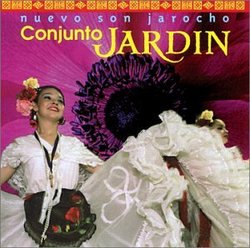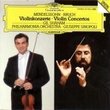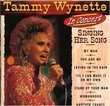| All Artists: Conjunto Jardin Title: Nuevo Son Jarocho Members Wishing: 2 Total Copies: 0 Original Release Date: 8/15/1998 Re-Release Date: 10/1/1998 Genres: International Music, Latin Music Style: Latin Pop Number of Discs: 1 SwapaCD Credits: 1 UPC: 791022076028 |
Search - Conjunto Jardin :: Nuevo Son Jarocho
 | Conjunto Jardin Nuevo Son Jarocho Genres: International Music, Latin Music
Released in 1998, Nuevo Son Jarocho is the debut CD of Los Angeles-based Conjunto Jardín. Updating and reinvigorating the lively jarocho music of Veracruz, Mexico, Conjunto Jardín is led by sisters Libby and Cind... more » |
Larger Image |
CD DetailsSynopsis
Album Description Released in 1998, Nuevo Son Jarocho is the debut CD of Los Angeles-based Conjunto Jardín. Updating and reinvigorating the lively jarocho music of Veracruz, Mexico, Conjunto Jardín is led by sisters Libby and Cindy Harding (the name is a play on the Spanish pronunciation of their last name). Their seamless sibling vocals ? reflecting 25 years of singing together ? are accompanied by Libby on jarana (small strummed 8-string guitar) and Cindy on requinto (a 4-string guitar on which percussive melodies are played with a long pua or pick). The sisters have played jarocho music virtually all their lives, starting as children learning from and performing with their father, renowned Latin American scholar and musician Timothy Harding. They have further honed their skills with trips to Veracruz and by studying with master jarocho musicians in Mexico and the U.S. Around the traditional core of jarana and requinto, Conjunto Jardín features Gary Johnson (Sabiá, Word of Mouth) on ?incredible keyboard-harp simulations? (Tom Cheyney, L.A. Weekly). Jarocho?s African roots are highlighted by Benin, West Africa native Marcel Adjibi (Manu Dibango, Aster Aweke) on congas and vocals, while Rick Moors (the Bonedaddys) plays bass and Ricardo ?Tiki? Pasillas (Marc Anthony) contributes percussion and gritos. The end result is a lively reinterpretation of the style that respects jarocho?s key traditions and captures its irreverent spirit with a fun, supercharged approach that gently modernizes the music while broadening its appeal. Recorded by Ciro Hurtado and mixed by Larry Hirsch, known for his work with Los Lobos, Ry Cooder and Bonnie Raitt, Nuevo Son Jarocho caught the ear of Putumayo World Music, who picked up ?La Bruja? from the CD for their compilation Putumayo Presents Mexico, released in April 2001. Similar CDs
|
CD ReviewsCrave the harp 12/22/2001 (3 out of 5 stars) "Nice try, but the keyboard hardly provides a similar harp sound. The group would be better served either with a real harp or without it at all. The voices are nice and the selection of tunes is ok. A matter of taste, but if you want to hear the real thing to compare, try the group Chuchumbe." It is a stunning success david r moore | carpinteria, ca United States | 12/03/2002 (5 out of 5 stars) "one of my absolute favorite recordings! incredible textures, layers and colors. for that alone, it is worth getting whether or not you are a purist, whether or not you even favor the music from that part of the world. positively infectious." A brilliant fusion of tradition and experimentation John D. Robles | Ventura, CA USA | 10/30/2002 (5 out of 5 stars) "Being a traditional Veracruz harpist myself, I was a little surprised (not to mention disappointed) when I found the album and read that the harp parts were played on a keyboard. But I had heard of the Harding sisters, and I know their father is a great harpist, so I plunged in. What a fantastic album. I know that there are purists that think the only harp is one with strings, but Gary's performance is astounding. I also play keyboards, and playing my harp 'pasos' on the keyboard is extremely difficult. Gary's agility with the pasos is very authentic too. Even if you are a jarocho purist, you will be surprised by the authenticity of this album, as well as pleased with the experimentational quality on such songs as La Bamba, where African elements are introduced. The Harding sisters' vocals are exciting and pure. The percussion and bass lines are well performed too. I submit that although this may not be jarocho in its most basic traditional form, it is nonetheless an evolution of the 'son jarocho' that delights and thrills its audiences every bit as much."
|

 Track Listings (10) - Disc #1
Track Listings (10) - Disc #1


